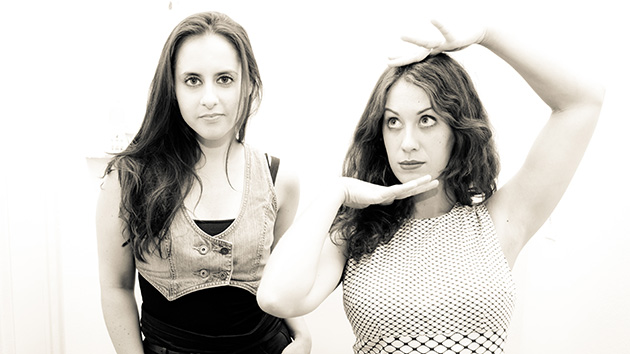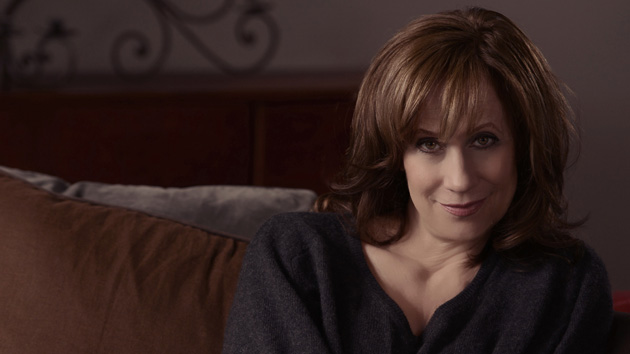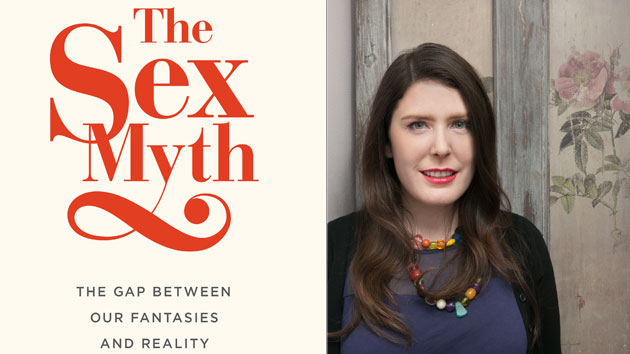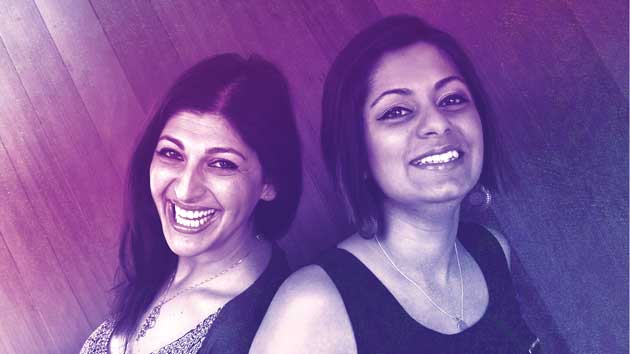
Corinne Fisher and Krystyna HutchinsonDee Guerreros
A few years ago, New York City-based stand-up comedian Corinne Fisher, 30, was going through a personal slump: She’d just been dumped unexpectedly by the man she thought she was going to marry, in a Panera Bread of all places. “I had what I would describe as a nervous breakdown,” she says. “I lost 20 pounds, my hair was falling out because I wasn’t eating properly.” She spent hours sobbing on the shoulder of her friend and fellow comic Krystyna Hutchinson, 27. But amid the moping, Fisher got an idea for a new project: She would take the High Fidelity approach and interview all of her ex-boyfriends and lovers to figure out what went wrong.
Hutchinson—who, like Fisher, is unabashedly horny and not shy about sharing her sexual escapades—was on board, but for a slightly different reason. She’d become frustrated by the “notion of shame around women who have a lot of sex and enjoy it.” So in December 2013, the duo, collectively known as Sorry About Last Night, launched Guys We Fucked: The Anti-Slut Shaming Podcast.
Every episode begins with an update on each woman’s sex life, but the podcast quickly evolved away from its focus on past paramours. There’s still plenty of chatter about threesomes and sex toys, but the show also takes on touchy topics like pedophilia, pimps, and sexual violence in frank conversations with comedians, actors, sex workers, and activists. Guests have included the likes of sex columnist Dan Savage, Daily Show creator Lizz Winstead, and female pornographer Stoya. Two years into its run, Guys We Fucked began to pick up speed, and it now boasts more than a half million listeners. In August, it became the top comedy podcast on iTunes for a stint. It’s still in the top 10—despite initially being blocked by Apple due to its profane title. I caught up with Fisher and Hutchinson to talk about Miley Cyrus, capitalism in the bedroom, and “no bullshit feminism.”
Mother Jones: What made you decide you were comfortable airing your sexual exploits and questions to hundreds of thousands of listeners?
Corinne Fisher: Nothing. Because we didn’t know that was going to happen. And now sometimes I’m like, “Damn.”
Krystyna Hutchinson: Corinne and I are really good friends and we’ve been working together for four or five years now, so our chemistry is really good. I say, “Okay, I’m just going to talk to Corinne”—and I can forget the fact that 100,000 people are about to hear me talk about my pussy.
MJ: Have you experienced any negative side effects of being so open about your sex lives?
CF: The negative side effects are very directly to my personal life. Being single and talking about being “a big old whore,” is not going to be the best sell for yourself for dating. But to play devil’s advocate, I don’t really want to date somebody who’s not comfortable with everything I’m saying.
MJ: What’s the best reaction you’ve gotten to the show so far?
CH: A couple credited us with them being able to conceive!
KF: The first email we got that blew my mind was from a girl in India who was raped by a member of her family, and then she started listening to the podcast. She said, “For the first time in my life I can look at myself as a sexual being.” We did one with Wendi Starling about the night she was raped. After that aired, we were inundated with emails from girls that experienced almost the exact same thing, with someone familiar. It really pushed home the message that this happens way too much. We’re opening up topics that not a lot of people are comfortable talking about. It’s exciting to know that at least it helps some people.
MJ: Why did you include “anti-slut-shaming” in the title?
KH: Just having a vagina made me want to include that in the title. There’s this shame around women who have a lot of sex and enjoy it. It’s one of the huge parts about being a woman that’s really frustrating. I really wanted to speak to that, and talk about our experiences with men who have been assholes, with men who have been great. Because that’s the one common denominator between all of my friends and me: We all have stories of a time that we were sexually harassed.
MJ: There are plenty of sex podcasts out there already. What was the void you hoped to fill?
CF: The one in my soul.
KH: One of the voids that we didn’t set out to fill but I feel like we are filling is no-bullshit feminism. We want to talk about the shitty stuff. We want to talk about what we’re bad at. We talk about how women are physically weaker than men. Some people don’t want to say that, but it’s true. Why can’t we just talk about it? And just scrape all the bullshit away. I respond to that type of feminism so much better. And I think it’s something that men can really get on board with, too.
MJ: Some people think sex motivates pretty much every decision we make, what we wear, who we talk to, everything we do all day. So why don’t women talk about it more?
KH: It all comes back to shame. The reason I don’t wear tops that show cleavage, because I have giant tits, is because one time in the eighth grade this girl accused me of sticking out my boobs to get boys to like me. These little tiny scarring things. I think you just get inside your head, and because no one else is talking about it, you stay inside your head and you think you’re alone in this kind of struggle to be open about your sexuality. That’s pretty much the core.
CF: There’s a lot more value on the sexuality of a woman than a man. If there’s too much sex on the market, the value of the item decreases. If you’re a woman who’s giving away your sexuality, even if you feel good about it, men look at you as something that has a lower value. I think we somehow got that into our heads that that is true. When really it’s just a mechanism of control.
MJ: So really your podcast is about trying to rethink capitalism?
CF: Kind of.
KH: Exactly.
MJ: A lot of your listeners are teens and college kids. Do you feel a sense of responsibility?
KH: We feel a huge sense of responsibility when someone young writes us. And we are very clear that we are not doctors. If we give you anything medical, it’s because we Googled it. The last thing we’d want to do is give anybody the wrong info, especially someone who’s impressionable.
MJ: You have a very lighthearted rapport about some pretty serious issues. Do listeners ever take offense?
CF: We always have to keep reminding the listeners: This is not a sex podcast. This is a comedy podcast where we talk about sex. Anyone who knows anything about comedians knows that we are very morbid people. We can find humor in pretty much anything.
MJ: Apple was censoring your podcast for a while. Did you ever figure out why?
KH: iTunes has third-party censors that kind of comb through everything to make sure nothing was missed. In our podcast the word “fucked” was not bleeped, because we were never told it had to be, and they just eliminated it from all search fields and charts. All the fans tweeting at iTunes podcast is actually what got Apple to call us personally to sort it out. And they were very cooperative and understanding and they apologized—so that was nice.
CF: But then they just bleeped out the word “titties.” I don’t understand that. There’s way worse words in our titles than “titties.” Apple is a notoriously conservative company, as are a ton of big companies. It’s not surprising—it’s just disappointing.
MJ: Is part of your strategy to lure people in talking about boobs and threesomes, and then subtly school them about safe sex and female empowerment?
CF: Would you want to listen to a podcast called “Sex Is Like Really Cool When We Consent?” or would you want to listen to a podcast called “Guys We Fucked”? I want to listen to “Guys We Fucked.” Those girls seem fun.
KH: So much of the sex talk is so clinical and boring and dull. I think what keeps people listening is that we are funny, and we do tackle some interesting topics.
CF: It was very specifically called “Guys We Fucked.” Yes, it’s crude, but the women hold the power in that title. Most times, a guy says, “Yeah, I fucked that girl.” No, no, no. This is guys we fucked. We did the fucking!
KH: It’s taking ownership of your sex life.
MJ: Journalist Rachel Hills had a book come out this year called The Sex Myth. She said, “We internalize this idea of sex as something that is constantly available and that everyone is doing, and if you’re not doing it, there’s something wrong with you.” Do you think our culture today is oversexualized?
CF: We can only speak to our own libidos. We just both coincidentally are hypersexual people. But we’ve had people on that are more vanilla, as we call them. There’s nothing wrong with that. We had a man well into his 30s who was a virgin, and there’s nothing wrong with that either. But yeah, of course we’re oversexed. We always talk about how we need crazier porn to get off, or a bigger vibrator. We’re an oversexualized society. But it’s also mind-blowing that in this oversexualized society, we’re also so ashamed of sex. We’re getting very mixed messages.
KH: I think what society is obsessed with is comparing themselves with everybody else. Everybody needs to relax. Stop comparing yourself to everybody. You walk down the street in New York and see billboards with beautiful women, and it’s like, yeah, they’re beautiful women. You don’t have to be that thin. You don’t have to be that beautiful. They’re nice to look at. The end.
MJ: If you could interview any celebrity or politician about his or her sex life, who would it be?
KH: [Assumes a high-pitched Southern drawl.] Beyoncé, because I love her. She is my Jesus. No, but really: Beyoncé.
CF: Miley Cyrus. She’s someone who’s made to look like an idiot. But if you really follow her online and listen to the things she says, she’s doing her own thing and being herself in the most basic way. Like yeah, you shaved your hair off and you sing in your backyard and you smoke weed and you’re sexual. Great! Do whatever the fuck you want. You’re an artist. That’s what you’re supposed to be doing.
KH: She deserves a lot more respect. Everyone loves to roll their eyes at her. The same way everyone loves to roll their eyes at Kim Kardashian. Who cares? She is not interrupting your life. It astounds me how people can hate certain celebrities so much. When, honestly, 99 times out of 100, it’s just because they hate something about themselves.
MJ: If you were moderating one of the debates, what would you ask the candidates?
KH: My question would be around the Planned Parenthood videos. Every single [GOP] candidate was really using propaganda at its finest. I was so frustrated that no one called them out to say, “No, Planned Parenthood is getting consent from the mother of that fetus to extract fetal cells to donate for research.” It’s so different. What’s happening is that all these idiots watching the debate, a lot of them are impressionable, and it’s kind of dangerous. They’re going to hop on this train of, “They’re selling baby parts for money? Fuck that.” And now everyone wants to defund Planned Parenthood.
CF: Mine would be—no bullshit, “Why do you want to be president?” But it’s just full of fake answers and bullshit. I like who I like, Hillary Clinton! I am not really holding out for a hero to help change the world. I’m going to change the world my fuckin’ self as much as I possibly can. I can’t be waiting around for other people to do it.
KH: Insert slow clap.
MJ: What inspires you about Hillary?
CF: I love a hard worker. She’s fucking put in the time. I don’t think there is in history someone who’s wanted and tried to be president more. Give her a shot. I think she’s really shown up and she’s going to give it her all.
MJ: Who are you hoping to talk to in future episodes of the podcast?
KH: People who have had something really dark happen to them and want to talk about it. Or sex workers. There are so many people whose jobs are related to sex that we’d love to talk to. And comedians we really admire who are comfortable talking openly about their sex life. Models. We have a dream list of guests. It’s very long.
MJ: So, you won’t be interviewing many people that you’ve slept with anymore?
CF: Honestly, I talk about sex so much now that I’ve become more conservative in my personal life. I’m not as into it anymore. That sounds terrible, but it’s like my job.

















